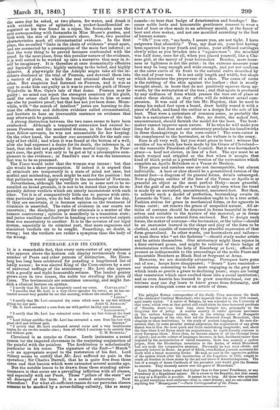The polyglot Roman correspondent of the Daily News announces the
death of the celebrated Cardinal Mezzofanti; who departed this life on the 16th instant, aged nearly eighty. "A native of Bologna, he was azhooled in the University of that town, which even at that period still could claim its time-honoured predicate of Bononia docet,'—a boast long since brought low, principally by the Gregorian line of policy. A zealous anxiety to confer spiritual assistance on the various foreign soldiers, who in the stirring times of Bonaparte filled the hospitals of the city, first led the Reverend Joseph Mezzofanti, then chaplain to these institutions, to the study of modern languages. Ile soon dis- covered, that, by some peculiar mental adaptation, the acquirement of any given dialect was to him the most quick and facile undertaking imaginable; and, about the time when Lord Byron made his acquaintance, he could fluently converse in every European idiom. Since then, he became master of all the Oriental forms of speech; and as the science of languages becomes, in fact, facilitated rather than impeded by the accumulation of varied resources, there was scarcely a spoken jargon, from the Himmalaya mountains to the Andes, of which Mezzofanti had not made the comparative anatomy. Personally he was most affable, and generally beloved in Rome. As proof of which, even Radical journals announce his death with a broad mourning border. He took no part in the oppressive politic of the system which after the insurrection of the Legations in 1831, sought to crush all freedom in these states by the aid and terror of Austrian bayonets. The loss of a couple of dozen Cardinals of the prevalent sort would give the Romans no concern. They sincerely sorrow over the grave of Mezzofanti."
Louis Napoleon looks a good deal higher than to four pans' Presidency, or any Presidency of a Republican nature. He is sworn to the Republic, but that means as long as a Republic is possible. It cannot be so long. All those who attended his grand receptions wore uniforms—that is, court dresses; and no one called him anything but "Monseigneur r—Paris Correspondent of the Times.


























 Previous page
Previous page